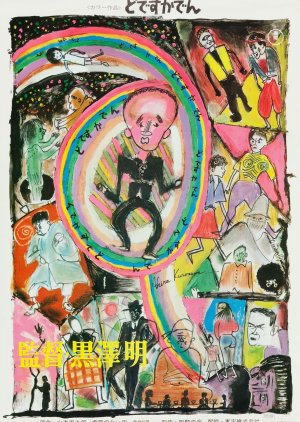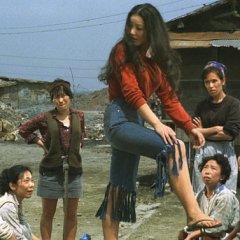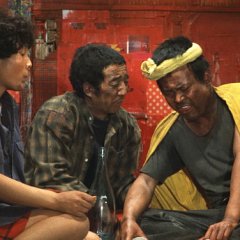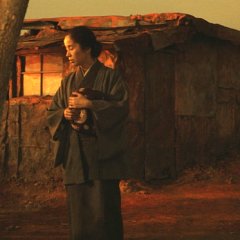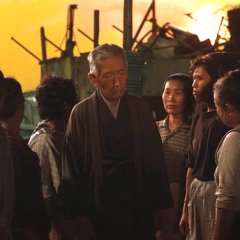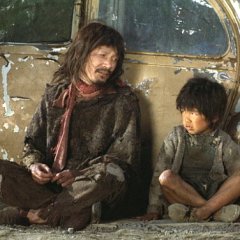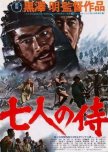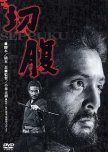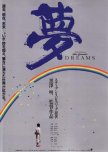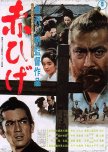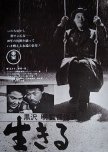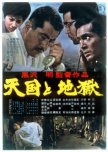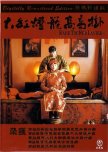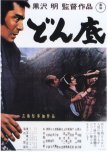The film focuses on the lives of a variety of characters who happen to live in a rubbish dump. The first to be introduced is a mentally challenged boy who lives in a world of fantasy in which he is a tram conductor. He is both the tram and the tram driver and follows a set route and schedule through the dump; his dedication to the fantasy is fanatical. The film title refers to a Japanese onomatopoeia for the sound made by a tram or train while in motion ( "Do-desu-ka-den do-desu-ka-den do-desu-ka-den"). The sound is made by the boy as he makes his daily faux-tram route through the dump. (Source: Wikipedia) ~~ Adapted from the novel "Kisetsu no Nai Machi" (季節のない街) by Yamamoto Shugoro (山本 周五郎). Edit Translation
- English
- magyar / magyar nyelv
- dansk
- Norsk
- Native Title: どですかでん
- Also Known As: Dodes'ka-den
- Screenwriter & Director: Kurosawa Akira
- Screenwriter: Hashimoto Shinobu
- Genres: Drama
Cast & Credits
- Sugai KinOkuniSupport Role
- Tanaka KunieKawaguchi HatsutaroSupport Role
- Yoshimura JitsukoKawaguchi YoshieSupport Role
- Igawa HisashiMasuda MasuoSupport Role
- Negishi Akemi Support Role
- Ebata Takashi Support Role
Reviews

"It's like a bucket of sand poured over my head"
During Japan's economic boom period, Kurosawa Akira made a film about those who did not benefit from it, living on the fringes of society within or next to a large trash heap. Dodeskaden was his first film in color and he took full advantage of it with brightly painted backdrops and buildings. The colors did not translate into the drab, tragic lives of the people who lived there, as they continued moving in endless circles unable to escape their meager existence.The film begins and ends with teenage Rokuchan and his mother as they chant their Buddhist mantra. The mentally challenged teenage boy believes himself to be a streetcar operator and each day he goes out to his imaginary streetcar and runs his routes through the shanty town. As he "drives" along, he calls out "Dodeskaden", the sound a trolley makes. Out of all of the characters, his full imaginary life might actually be the happiest. Other characters are not so lucky, an overworked niece becomes a victim of rape, a man who saw something he shouldn't have walks around unspeaking with dead eyes, a father and son live in a car with the son begging for their food in town when they need it, and a man with a distinctive facial tic has to put up with a harridan for a wife. For comic measure two day worker drunks swap wives and the viciously gossipy Greek chorus of woman who gather around the water pump give their commentary throughout. A man who makes hairbrushes has a wife who has given him five children with a sixth on the way with none of them being his. And lastly there is the old village saint who tries to help where he can.
Kurosawa has vilified the upper classes and their consumerism in other films. In this one he shows the plight of society's outcasts. Much like The Lower Depths, he doesn't make the characters sympathetic for the most part, only the youngest and most vulnerable who suffer bitter fates. Most of the characters don't truly interact, only tied together by proximity.
While Kurosawa's skill shows through as well as the actors, I can't say I particularly liked this film. Justice hides her face. Redemption is but a dream. And hope is so far in the distance that most people live their lives in resignation to their lots. With the exception of dutiful Rokuchan's mother, women are portrayed as harpies and harlots, completely untrustworthy and for the most part interchangeable. The men are given much broader range from mentally ill to lazy to drunkards to industrious to kindly generous to wise old sage.
With all the drudgery and tragedy, a few moments of quiet and joy exist even when only in the imagination. There are beautiful surreal paintings of the house the father and son build together in their minds while starving in the car. Rokuchan's drawings of streetcars on every surface in their hut and his imaginary world are quite vivid. The wise sage tricks a suicidal man into wanting to live and stuns a burglar in his house with generosity. Those gentle moments are few and far between.
Despite Kurosawa's skill behind the camera and the general resilience of the people living on the outside of society, the flat, negative portrayal of women, and the relentless negativity dragged this film down for me. To quote one of the characters, "It's like a bucket of sand poured over my head."
2/22/23

